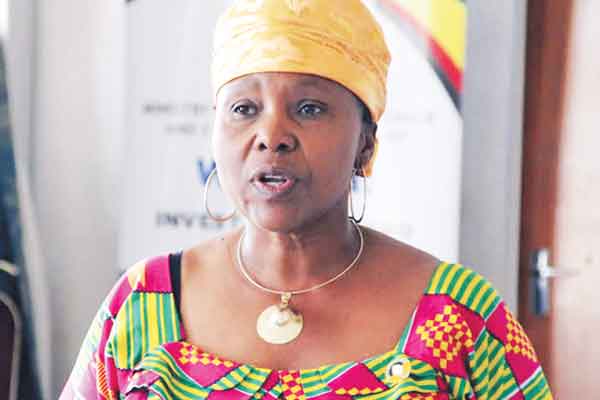
Environment, Water and Climate minister Oppah Muchinguri-Kashiri (pictured) says children should be provided with the essential knowledge and skills on the environment to enable them to deal with environmental challenges they would encounter after completing their education. By Winstone Antonio
Muchinguri-Kashiri made the remarks last week at the belated celebrations of the Green Valentines Dinner organised by jazz crooner Dereck Mpofu in partnership with her ministry at the mayoral mansion in Harare. The event was meant to celebrate the love for the environment.
“We are facing quite a number of environmental challenges such as climate change, biodiversity loss, illegal waste dumping, deforestation, poaching and veld fires, among others,” she said.
“It is unfortunate that these challenges are mainly a result of anthropogenic activities, negative attitude and lack of behaviour change of our people.
“Children should be provided with the essential knowledge and skills on the environment as this will enable them to be able to deal with environmental challenges they would encounter after completing their education.” Muchinguri-Kashiri has bemoaned the continuous increase in environmental problems over the years saying a change in behaviour and mindset towards environmental issues would enable the creation of a clean and safe environment that future generations could also enjoy.
“Section 73 of our Constitution enshrines environmental rights to our citizens and advocates us to ensure that we do not impact on future generations’ access to these resources to allow them to enjoy the same as we are,” she said. The minister said as government they had several pieces of legislation that complement the constitutional provision such as the Environmental Management Act, Forestry Act and Parks and Wildlife Management Act.
“The government in partnership with development partners is working tirelessly in coming up with implementable actions to manage these environmental challenges. Despite our efforts to enforce the provisions of the environmental Acts, and also providing an enabling environment for different sectors to address these provisions, we have seen an increase in environmental problems over the years,” she said.
“We produced the Climate Change Response Strategy to guide national response measures in addressing the impacts of climate change. Through the Environmental Management Agency, we have put in place veld fire control mechanisms. The Zimbabwe National Water Authority is also making sure that our catchments are well managed and our water resources are protected.”
- Chamisa under fire over US$120K donation
- Mavhunga puts DeMbare into Chibuku quarterfinals
- Pension funds bet on Cabora Bassa oilfields
- Councils defy govt fire tender directive
Keep Reading
Muchinguri-Kashiri said it has been established that more than 60% of people in Zimbabwe have limited environmental knowledge and this is likely to worsen the effects of the environmental challenges on human beings as demonstrated by the 2016/2017 floods, where communities continued to cross flooded rivers at a time when the Civil Protection Unit was also scaling up awareness raising.
“With an understanding that informed communities are empowered communities, my ministry is also implementing a comprehensive nationwide environmental education programme. The programme will assist individuals and communities to better understand the complex nature of the natural environment and acquire knowledge, values, attitudes and practical skills to participate in environmental management,” she said.
“My ministry has been working with the Curriculum Development Unit to make sure environmental issues are taken seriously in the curriculum. I am glad that the Ministry of Primary and Secondary Education came up with a new curriculum that talks much about the environment.”
Muchinguri-Kashiri said the new curriculum was an important tool in transforming behaviours and delivering messages about the environment to students who constitute the majority of the population.
“I believe that educating people from early stages of learning about the environment and the importance of protecting it is the rationale in promoting responsible behaviour. As the government we will ensure that we create a reliable legacy and that our children and youths become functional members of society and are environmental champions,” she said.
Mpofu, who is also the Green Ambassador, is organising and advocating for the development of an Ecohub environmental training centre in Mutare.
He said this Ecohub centre, the first of its kind in Zimbabwe, would set a precedent on environmentally sustainable businesses and practices aiming at achieving environmental sustainability through building generations of environmentally-conscious youths and children.
“With annual expenditure of $234 million, there is still no direct platform for young people to access opportunities on the environmental sector. The centre shall offer different services that will include skills in mushroom production, recycling, and tree cultivation funded by micro-finance youth serving organisation,” he said.
Mpofu said there was lack of co-ordination within the environmental sector, despite having 185 registered youth-led organisations, five government ministries with the environment as a primary priority and over 20 international development agencies providing support for the environment.
He said the training centre would offer training in mushroom production, waste recycling and tree cultivation, among others. “The Ecohub Centre shall provide access to environmental information, environmental career guidance and training and access to details on law and policies pertaining to the environment,” he said.











